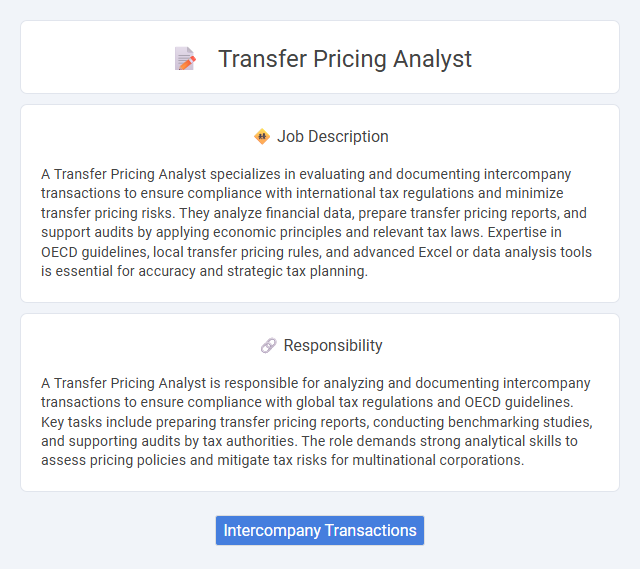
A Transfer Pricing Analyst specializes in evaluating and documenting intercompany transactions to ensure compliance with international tax regulations and minimize transfer pricing risks. They analyze financial data, prepare transfer pricing reports, and support audits by applying economic principles and relevant tax laws. Expertise in OECD guidelines, local transfer pricing rules, and advanced Excel or data analysis tools is essential for accuracy and strategic tax planning.
Transfer pricing analyst roles likely suit individuals with strong analytical skills and attention to detail, as the job demands precise data interpretation and compliance with tax regulations. People who are comfortable working with complex financial information and possess strong communication skills to collaborate with cross-functional teams may have a higher probability of success. Those who prefer routine tasks or struggle with ambiguous regulatory environments might find the position less suitable.
Qualification
A Transfer Pricing Analyst requires a strong background in finance, economics, or accounting, often supported by a bachelor's degree in these fields. Proficiency in data analysis, financial modeling, and understanding of international tax regulations and OECD guidelines is essential. Advanced qualifications such as a CPA, CFA, or a master's degree in taxation or economics significantly enhance expertise and career prospects.
Responsibility
A Transfer Pricing Analyst is responsible for analyzing and documenting intercompany transactions to ensure compliance with global tax regulations and OECD guidelines. Key tasks include preparing transfer pricing reports, conducting benchmarking studies, and supporting audits by tax authorities. The role demands strong analytical skills to assess pricing policies and mitigate tax risks for multinational corporations.
Benefit
A Transfer Pricing Analyst likely improves a company's compliance with international tax regulations, reducing the risk of costly audits and penalties. They probably enhance accurate documentation and valuation of intercompany transactions, potentially leading to optimized tax liabilities and increased profitability. This role may also provide insights that support strategic decision-making in global business operations.
Challenge
Transfer pricing analysts likely face the challenge of interpreting complex international tax regulations that vary across jurisdictions, requiring meticulous attention to detail and strong analytical skills. The probability of encountering frequent updates in tax laws means these professionals must continuously adapt their strategies to ensure compliance and minimize risk. Managing the balance between corporate financial objectives and regulatory requirements often presents a significant challenge in this role.
Career Advancement
Transfer pricing analysts develop expertise in international tax regulations and financial modeling, positioning themselves for roles such as senior analyst, transfer pricing manager, or tax consultant. Mastery of data analysis tools and compliance frameworks enhances career growth opportunities within multinational corporations and consulting firms. Continuous learning in OECD guidelines and cross-border transaction structuring is critical for advancing to leadership roles in tax strategy and global finance.
Key Terms
Intercompany Transactions
A Transfer Pricing Analyst specializing in intercompany transactions ensures compliance with international tax regulations by analyzing and documenting pricing arrangements between related entities. They prepare detailed transfer pricing reports, conduct benchmarking studies, and evaluate the arm's length nature of transactions to minimize tax risks and avoid double taxation. Expertise in OECD guidelines, local transfer pricing laws, and ERP systems enhances accuracy in managing intercompany agreements and financial data.
 kuljobs.com
kuljobs.com